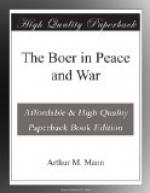‘Have you finished?’
‘Yes,’ he replied in the ‘lands taal’; ’but surely you are in a very great hurry. I will pay you well for the food and shelter.’
‘That’s nothing,’ continued the vrouw in a business-like tone; ’I only want the tablecloth so that I can get the bed made.’
CHAPTER VIII
The Boer is a pious person, who prays to God when he wants rain, and forgets to pray when his mealie crop proves a success. Unlike other people, he does not believe in thanksgiving when he shells one hundred bags of mealies where he only expected twenty. He has no ’harvest home.’ He simply stores his mealies until such time as he can bring them to town and obtain the best possible price. But let the rain stop away too long and the sun wither up his crops, and he is a very different man. In every Boer house there is a large Bible, and that Bible is systematically read and re-read when the fates are unkind. The very low class Boer is, of course, unable to read his Bible, but he takes it over to his nearest neighbour, whose education may not have been neglected to the same extent.
[Illustration: Boers OUTSPANNED for Nachtmaal.]
The Boer journeys to town once every three months with his family in order to attend Divine Service. These occasions are known as Nachtmaal. He brings his waggon with him, and outspans on some open space within the town. When he cannot arrange for a room or rooms gratis, he sleeps in his tent waggon. He very seldom goes to a hotel, unless this course is absolutely necessary. If he does go to a hotel, he engages a room only, and dines alongside his waggon or else he goes to his particular storekeeper and indulges in sardines and sweet biscuits He is great on sardines, and his only regret perhaps, is that the tin is not edible also.
A Dutch Nachtmaal in the olden days was a sight quite equal to any Lord Mayor’s show. The costumes were unique; but in the present day the womenfolk in particular have learned to ape the English, and the colours are therefore less conspicuous. Formerly the young ladies wore short dresses of many colours, and the display of white stockings was very general. The men appeared in black felt hats with huge brims, and frock-coats (most of them bordering on green) were the order of the day. Veldschoens of home manufacture were never wanting, but in these latter days veldschoens are regarded with contempt.
The man who probably suffers most at Nachtmaal-time is the organist, for organs are now regarded as indispensable. An organist is usually a man of a sensitive nature, and on such occasions his ideas of good music are apt to be completely demoralized. Nevertheless, he gets along as best he can, and even if he happens to be dragging a congregation numbering three hundred voices seven whole notes behind his instrument, he continues to suffer nobly and silently.




